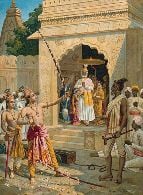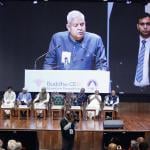The Ramcharitmanas was written by poet and mystic Tulsidas Goswami. It is a phenomenal work on the life of Rama and represents an invaluable edition to the corpus of Ramanayana versions through history. Below is the link to download the pdf in Hindi and English.
Ramcharitmanas in Hindi and English – PDF
The book includes both the Hindi version and its English translation. Additionally, the book also includes Romanized transliteration of the Hindi version for those who can speak the language but cannot read it. The file is 27 MB.
Be sure to check out the public domain books page for more puranas, epics and other interesting books to download.
More Free Stuff
 Vairagya is a collection of sacred chants that include Nirvana Shatakam, Aum Namah Shivaya and Guru Paduka Stotram.
Vairagya is a collection of sacred chants that include Nirvana Shatakam, Aum Namah Shivaya and Guru Paduka Stotram.
 “Shiva – Ultimate Outlaw” is in the words of yogi and mystic Sadhguru, and gives us a dynamic and unique look at the many aspects of Lord Shiva, that are not found elsewhere.
“Shiva – Ultimate Outlaw” is in the words of yogi and mystic Sadhguru, and gives us a dynamic and unique look at the many aspects of Lord Shiva, that are not found elsewhere.
 The Lord Shiva app is a one-stop guide to Lord Shiva. Get chants, stories, temples, wallpapers and more.
The Lord Shiva app is a one-stop guide to Lord Shiva. Get chants, stories, temples, wallpapers and more.
Download Android App
Ramcharitmanas Verse Structure
As guidance for reading, note that the Invocations from Sanskrit are to be read with no syllabic stress; but the other forms — chaupais, dohas, sorathas and chhands — will, I am sure, give their own stress and rhythm as they are read. The chhand is infrequent; it is generally given when the story reaches some ecstatic and intense point. The soratha is generally used to quieten or slow down the narrative after an uplifting session. The chaupais and dohas, one generally following the other, are the common poetic forms for narrative or expression of thought. Accent marks to vowels are not added to indicate proper pronunciation; the following hints will help in pronouncing the names and the few words given in Hindi form: ‘a’ is either long as in father, or short as ‘u’ in but; ‘a’ is never pronounced as in fat, there is no such vowel sound in Hindi; ‘i’ is either short as in it, or long as ‘ee’ in feet (Sita is pronounced Seeta, but Siva has I as in it); ‘u’ is short as in put, or long as in rule; ‘e’ is always as ‘a’ in fate (never as in get); ‘ai’ gives the sound of ‘i’ as in kite; ‘o’ as in note (never as in got); and ‘au’ as ‘ow’ in how. But these vowel sounds should not be exaggerated, as is the tendency of some English-speaking people. In most places rhythm and smooth reading will indicate whether a vowel is to be pronounced as long or short. All else will, I think, be straightforward.
The edition of Ramcharitmanas followed for purposes of this rendering has been that of Chaturvedi Dwankaprasad Sharma in close consultation with the editions of Dr Mataprasad Gupta, the Gita Press and Dr Shyam Sundar Das.
Atkins in fact has a word of thankful appreciation to Mr Devadas Gandhi of The Hindustan Times (a son of the Mahatma), who has so readily and generously undertaken, at expensive risk, the publication of the work. Atkins says, “My sincere thanks also to his deputy, Dr. S. N. Vyas, who has supervised the preparation especially of the Hindi-English edition, and whose counsel has helped to correct or improve in the English rendering some expressions and interpretations. Not that the work is now without blemish; in the true spirit of Tulsidas I must acknowledge that there are imperfections, and must ask beforehand, as did he, the patient forbearance of those who note such things. This is not intended as a word-for-word literal translation; indeed, such would not be a true translation, for it would often misrepresent in English what the author tried to say in the Indian language of his day. It is intended to interpret, while following the text as closely as possible; thus at times phrases may seem to differ from the original, but on the whole, I believe, it follows closely Tulsidas’s own words and does not misrepresent even when it departs somewhat from them. The combined Hindi-English edition will have, I believe, real value for students, Indian and foreign, in all language areas of India. The English edition should be both interesting and enlightening to those in India who are familiar with the Hindi, and to those abroad who will have no interest in or need of the Hindi, but wish to become acquainted with this literary and religious classic of India. I offer this as one fruit of almost forty years’ life and service with the people of India, in town and village, as a tribute to many friends whom I love and great figures whom I revere; also in the hope that it will bring India and other peoples nearer to one another and help to a fuller spiritual life in deeper appreciation of earnest seeking, longing and finding as here portrayed.
About Ramcharitmanas English Translations
Here’s the story of one of the first major translations of Tulsidas’s Ramayana, from the Awadhi language to English. It was in February 1951 that the Rev. A. G. Atkins first wrote about his verse translation of the Tulsi Ramayana. He did so at the instance of a friend, the Rev. J. Z. Hodge, whom Gandhi had met and got to like in Champaran in 1916. Mahatma Gandhi was himself a great lover of Tulsidas’s story, and is said to have read it regularly, wherever he could. Mr Atkins had spent a good part of his life in the noble enterprise and was feeling rather disappointed at not being able to interest any publisher in it. It was, he realized, in every way a great responsibility, but he hoped someone would be prepared to undertake it. This was why he had approached Gandhiji, whose sone Devdas Gandhi was in the publishing business.
People would generally dissuade any Indian wanting to render the epic into English verse. But here was one whose mother-tongue was English presenting a complete translation devotedly done of a book representing the best that India has to offer. He was, besides, a missionary who had known and lived in India. The British publishers could not have wished for a better combination. All Gandhi’s son had to decide was whether his approach to the great task he had accomplished had been in the right spirit and whether he could commit the Hindustan Times organization -where he worked – to the moral responsibility of placing this version before the English-knowing world. Gandhi’s son says, “I was more than satisfied with the diligence and consecration — to use the word he applies to Tulsidas — the translator had brought to bear on his work. I, therefore, sent sample stanzas to a number of friends and scholars seeking their advice. The consensus of opinion was in favour of publication. Even so, it had to be the Ramayana of Tulsidas to persuade me prayerfully to undertake the task on behalf of the Hindustan Times.”
In the production of these volumes, Devdas had the unstinting cooperation of several of his colleagues. Should the sales leave any surplus it was planned to be devoted to the cause of propagation of the Ramayana which probably is the strongest single force that binds the Indian masses together.
Recitation of verses from the Ramayana was part of the routine of Gandhi’s expanded family in South Africa. Mahatma Gandhi was fond of repeating them aloud to his family. He particularly made them memorize soratha 1 and chaupai 2 of the Invocation, dohas 20 to 26 of the Salutation to Rama, especially doha 22, in Book I, and chhand 13, in praise of Bharat, in Bode II. A verse he often quoted is doha 112 in Book I. These are but few of the innumerable gems that scintillate the Ramayana.
The language of Tulsidas is not easily followed without special study. Those more familiar with English than with the North Indian dialect used in the Ramayana will, therefore, find the Rev. Atkins’ translation extremely helpful in understanding the original. I have myself profited by it. Indeed, the Atkins version of the Ramayana gives me the greatest satisfaction. The exigencies of rhyme and of Tulsidas’s metre forms which, in the true spirit of scholarly service, the translator has adapted with remarkable success impart the flavour of the original epic to the poem in English. Some may regard it as unorthodox from the strict English literary point of view. But I for one like it for that very reason. It is Tulsidas who is presented and whom Mr. Atkins is interested in presenting. The reader will know how to make allowances, for here there is no scope for irreverence.
One of those who encouraged Devdas in this venture was his friend the late Parasnath Sinha. He belonged to the land of Sita, the consort of Rama. He had been looking forward keenly to the completion of Atkin’s work. To his memory is dedicate the first publication of Atkin’s version.
Tulsidas Ramcharitmanas Table of Contents
The Ramcharitmanas is split into seven sections of kandas, as is Valmiki’s Ramayana. Tulsidas follows the same structure and naming convention as Valmiki, the first poet or Adikavi. The sections or books are as follows:
Book 1 — Childhood and youth or Balakanda
Book 2 — Events in Ayodhya or Ayodhya kanda
Book 3 — In the forest or Aranya kanda
Book 4 – The monkey kingdom or Kishkinda kanda
Book 5 — The beautiful or Sundara kanda
Book 6 — In Lanka or Yuddha kanda
Book 7 – The finale or Uttara kanda
Ramcharitmanas Dohas 1-10
(Happiness and Tragic Sorrow in Ayodhya City and Kingdom)
Sanskrit Invocation and Praise
He on whose left shines the mountain princess, from whose head springs Ganges, divine river;
Who as signs shows on his brow the new moo drug stain on his throat and snake as sacred thread;
He adorned with streaks of ash, the lord of gods and of all beings, the Unchanging;
Like the moon in hue; destroyer; Siva, Omnipresent Lord! Me ever do thou guard.
He who showed no pleasure when anointed king,
nor sorrow at his exile to the forest,
I adore him, Raghunandan; may the glory of his lotus-face forever bless me;
He with body dark and tender as the lotus blossom, and with Sita on his left hand,
He who bears with grace the bow and arrow in his hand, the. glorious monarch of Raghu’s line.
DOHA 1
With dust from my own guru’s lotus feet cleanse I All filthiness from my mind’s mirror,
And praise Rama’s spotless renown that assures me All good, as it frees me from error.
From the time Rama came to his home newly wed, All around daily new joys and pleasures were spread;
The fourteen created realms seemed like great mountains, And bliss-showers fell from good deeds like cloud fountains;
True wealth and success with full unhindered motion Flowed onward to Ayodhya as streams to the ocean;
The town’s men and women; like gems of great worth And great beauty, were noble in life as in birth.
The city’s perfection surpasses all telling;
It seemed the Creator in power was excelling;
The people in all things found happiest blessing,
The vision of Rama’s face always possessing;
The queen-mothers, with every friend and handmaiden, Rejoiced at the vine of their hopes so fruit-laden;
Young Rama, so handsome, so good and so gifted,
The king saw and heard of, his heart thus uplifted.
DOHA 2
The people were all with one longing inspired, Which to Siva in pray’r they expressed;
CHAUPAI 2
That the king, while still living, young Rama as heir With the kingdom and pow’r would invest.
One day the king sat in a royal durbar,
With officials and nobles from near and from far;
In him worthy deeds seemed to reach fullest height;
Of the virtues of Rama he heard with delight;
Every other king looked for his grace and support,
And the gods themselves all seemed his favour to court.
Wherever through the worlds or through time one’s mind fared, Not a one could in fortune with him be compared,
Having Rama as son, source of all that is good;
Words could never be found this to tell as one should.
The king took up his mirror, as oft he had done,
And looked in it a moment to straighten his crown;
Thus he saw whitened hairs gathering over his ears;
There they spoke as the voice of his now advanced years:
“Let Rama, O king, now be set on the throne,
“And your own birth and life its fulfilment thus own.”
DOHA 3
So with this as the thought and intent of his heart,
On a suitable day and occasion,
He went to his counsellor, and with deep joy And love, told him of this his persuasion.
CHAUPAI 3
To the saint he said, “O best and wisest of men,
“Rama’s fitted, all things in his power and ken;
“Every citizen, minister, helper or servant,
“To me friend or foeman, indifFrent or fervent,
“To all of them Rama is dear as to me,
“And in him truest blessing embodied they see;
“All the priests and their families, reverend sir,
“Just as you, upon him their affections confer.
“Those who bow in the dust at the feet of their lord, “Others to them all glory and power accord;
“None in bliss is my equal the whole wide world through; “To your graciousness answ’ring my meekness ’tis due;
“Just one wish unfulfilled in my heart yet remains; “This can also be done if your grace so ordains.”
The saint was well pleased at this loving demand,
And replied, “O king, give me your royal command.
DOHA 4
“Your name and your fame are the capable givers “Of all your good wishes, O king;
“O gem of all rulers, the fruit of your wish “Follows on as the natural thing.”
CHAUPAI 4
Thus seeing his counsellor willing and pleased,
All the thoughts of his heart the king gladly released:
“Kindly send out the word that the council be called,
“And let Rama as ruler at once be installed;
“Let this glad thing happen while still I am living,
“Which bliss to all eyes will for ever be giving. –
“Great Siva does all things, my lord, by your favour; “With this wish fulfilled, I shall know peace forever;
“I’ll not worry whether I live or have sentence “Of death, for no cause will remain for repentance.”
At these words of Dasrath, which glad hope instilled, With new joy was the heart of the saintly one filled:
“He whose anger brings grief and remorse,” he replied, “He whose worship neglecting dire woe must betide,
“That Lord Rama, O king, he the Most Holy One,
“The All-loving, has deigned to be bom as your son.
DOHA 5
“Let there be no delay, but as ruler at once “Give the order and make preparations;
“The council call quickly; the day Rama’s given “The throne will bring high celebrations.”
The king called at once, when he came to his dwelling,
For Sumant, his minister, gladness upwelling,
“All honour, O king!” Sumant said as he bowed;
Then the thoughts of his heart the king uttered aloud:
“Today did the saint his mind gladly declare,
“That prince Rama be given the throne as the heir;
“If the council approves let a day be appointed,
“And joyously Rama as king be anointed.”
At this was Sumant with fresh gladness inspired;
Like a well-watered plant was the thing he desired;
With hands humbly clasped thus he made his petition, “Long years may you live, sir, in happy condition;
“A blessing ;o all is the plan you have made,
“Let it be done at once, my lord, not be delayed.”
Well pleased was the king when these thoughts he was told, As a creeper grows strong on strong boughs laying hold.
DOHA 6
“Whatever the orders,” he said, “that are given “By Vashishth, the saint and devout,
“To carry through Rama’s anointing as king,
“And installing—be those carried out.”
CHAUPAI 6
Vashishth said in tones that were eager and lowly,
“Bring water from all places sacred and holy;
“Bring all kinds of spices, of flowers and fruits,
(Each one naming) “and all kinds of herbs and of roots;
“Finest feathers and fans, skins of every kind;
“Woven cloth, silk and wool; clothes—the best you can find;
“Bring us all kinds of jewels and auspicious things
“That the world thinks should serve the anointing of kings.”
In details he gave things ordained in the scriptures,
And said, “Put up varied and beautiful structures;
“Have planted along the streets fruit-bearing trees,
“Mango, betel-nut, plantains, with fruit that will please;
“With the finest of gems mark out beautiful squares;
“Ask the people to decorate all the bazaars;
“Worship Ganesh, your family priests for their worth,
“And the gods; serve all Brahmans as lords of the earth.
DOHA 7
“Have flags, banners, arches, and pillars prepared,
“Also elephants, chariots and horses.”
The people accepted these orders and gladly Began work with all their resources.
CHAUPAI 7
The work that the saint asked of each to be done,
By each person that work as the first was begun.
The king honoured Brahmans, saints, each divine being,
Sure hope of the welfare of Rama thus seeing.
As news of the coming enthronement went round,
Happy music nnd greetings began to resound;
And both Sita and Rama, by throbs in the side Of the body—good omens—knew good would betide.
A-thrill with their love they said one to the other,
“This means the return of dear Bharat, our brother;
“Long days, since he visiting went, have gone by;
“All these signs say a dear one’s arrival is nigh;
“To us in this world none than Bharat is dearer;
“The signs mean he’s coming, each day getting nearer!”
His brother was in Rama’s heart day and night,
As a turtle yearns over her eggs out of sight.
DOHA 8
Th^ news of the crowning moved all the fair ladies Of court with the gladdest emotion;
As, seeing the full moon in all its bright glory,
Joy uplifts the waves of the ocean.
CHAUPAI 8
The ones who first brought to the palace the news,
Received jewels and clothing, the best they could choose.
The queens were all thrilled with love, all gladsome-hearted; At once plans for great decorations they started;
Sumitra laid many a beautiful square,
Made of all kinds of precious stones, costly and rare;
Rama’s mother, exulting in thoughts of her boy,
Called the Brahmans and gave them large gifts in her joy;
To the gods of heaven, nature and household she prayed, With her offerings and promises now to them made:
“By means Rama’s welfare forever assuring,
“Pray bless us, upon us your mercy outpouring.”
Fawn-eyed, moon-faced women, in glad tones and words, Sank bright songs—voices theirs like the sweetest of birds.
DOHA 9
The news of Lord Rama’s anointing as king Warmed the heart of each woman and man;
At once, thinking out the most suitable ways,
They their festive adorning began.
CHAUPAI 9
“But in love to your dignity paid you no heed,
“And my house by your presence is holy indeed*
“Your wishes now tell me, my master, I pray you,
“And I as your servant at once will obey you ”
At these words of Rama so full of affection,
The saint highly praised and extolled him;
“By right as the light of the Sun-Race most bright “You speak courteously, Rama,” he told him.
CHAUPAI 10
This saint, praising thus Rama’s fine disposition,
For love giving love, gladly told of his mission:
“The king now as ruler intends to appoint you,
“And plans he is making as king to anoint you;
“By pray I and abstention begin now preparing,
“That all may go through with success and fine king.”
The saint with these words to King Dasarath returned;
Consternation seized Rama at this he had learned,
“Born together, we brothers share all things,” he said,
“All our lives with each other we’ve eaten, slept, played;
“Together ears pierced, donned and married, “As one and together through all things were carried;
“Must I in our spotless line one flaw now own,
“That the eldest without the rest come to the throne?”
The lord’s sorrowing love at this thing so adverse
Will remove from devoted hearts all thoughts perverse.
Ramcharitmanas Chaupais 11-20
DOHA 11
At that moment Lakshman came in, by his gladness And love all uplifted and thrilled;
And Rama, the moon to the lotus-like Sun-Race,
Gave welcome, himself with love thrilled.
CHAUPAI 11
By sweet music on instruments played of all kinds,
The whole city reveals the untold joy it finds;
All pray for the hastening of Bharat’s arrival,
That eyes, seeing him, may find happy revival;
In markets and shops, homes and places of meeting,
With these words the people give mutual greeting:
“Oh, hasten the day with its moment propitious,
“When all hopes will finish their fulfilment auspicious,
“When this blessed vision our eyes shall behold “Of our Rama with Sita set on thrones of gold.”
While they in bright hopes of tomorrow were basking,
Perverse gods in envy for hindrance were asking;
No hope or joy found they in Ayodhya’s great pleasure;
Bright moons do not please thieves who seek stolen treasure!
They sought Sarasvati, their prayers they presented,
Oft falling before her like persons demented:
DOHA 12
“O mother,” they prayed, “do thou act to remove “The distresses of which we now tell;
“If Rama will give up the throne and go off “To the forest, for us it will be well.”
CHAUPAI 12
The goddess was pained at the gods prayerful sallies,
“A frosty night I,” she said, “to beds of lilies”
The gods, seeing this, said, as efforts they doubled,
“In this, mother, no blame is yours; why be troubled?
“The nature of Rama you very well know,
“Far removed he from pleasure’s or sorrow’s vain show;
“Their deeds doom all creatures to joy or to sorrow;
“For us go to Ayodhya — at once, not tomorrow.”
Her feet they oft clasped, hard they pressed and persuaded;
She yielded, deploring their minds so degraded:
“So high their abode; yet so base are their ways,
“That they cannot endure others’ glory and praise.”
Then she said, with her thoughts upon coming events,
Scribes and poets will seek me and bless my intents.’;
Then went she to Dasarath’s town, thus her heart gladdened,
An eclipse by which hearts were troubled and saddened.
DOHA 13
She chose hump-backed Manthara, handmaid of Bharat’s Own motner, Kaikeyi the queen;
She poisoned her mind, filled her full of all mischief,
And then she returned all unseen.
CHAUPAI 13
The maid saw the city so well decorated,
Heard music and songs, saw the people elated;
1f An Indian commentator says: For the theme given by what she is at to do and its great outcome.
She asked what was happening, why all were so jolly;
They said, “Rama’s crowning!” In envious folly
This low-born, mean-spirited woman then thought,
“By tonight how can these things be all brought to naught?”
She looked round like a jungle-tribe woman who roams The woods, seeing and wanting the best honey-combs;
She sought Bharat’s mother and came to her wailing;
“What now has gone wrong?” said Queen Kaikeyi, smiling;
No word the maid answered, but stood glum and sighing,
Then woman-like shed tears with sobbing and crying;
The queen laughing said, “You’re an impudent minx, “Lakshman’s taught you a much-needed lesson, methinks.”
But the maid, evil-minded, still answered no word,
Simply stood like a poisonous snake breathing hard.
DOHA 14
The queen was now worried; said, ‘Why don’t you speak?
“Is our Rama not well, or the king?
“Bharat, Lakshman, or Shatrughna?” Even more pain To the hunch-back did these questions bring.
CHAUPAI 14
“My lady,” she said, “why should I lessons need?
“Could I dare to be impudent ever indeed?
“And with whom is all well if not Rama alone,
“When today the king promised to give him the throne?
“’Tis on Kausalya God’s greatest favour abide;
“Seeing her, none can hope for or come to such pride.
“Go and see how the city is gay and rejoices,
“Which seeing, my heart knows the pain it now voices;
“You’ve no thought for Bharat away at this hour,
“Though you well know you have the king fast in your pow’r;
“Foolish drowsy one, thinking of bed and of sleep!
“Don’t you see the king’s treacherous, crafty and deep?”
Her maid’s perverse mind with her loving words knowing,
The queen to her answered, her feigned anger showing,
“If once more you say things upsetting and wrong,
“Things that break up good homes, I will cut out your tongue!”
DOHA 15
But knowing that people one-eyed, lame or hunchback,
Are often perverse, wicked, vile,
And especially women, much more so if servants,
Kaikeyi went on with a smile:
CHAUPAI 15
“A lesson I’ve given you, all my love in it;
“I could not be angry with you for a minute!
“The day will be blessed and fine when comes true
“The great thing which I’ve heard at this moment from you.
“’Tis an unchanging law of the great Solar Race,
“That the elder son rules, younger takes helper’s place;
“If tomorrow our Rama as ruler is crowned,
“Then whatever you ask I’ll give, wherever found!
“I know Rama loves Every one of us mothers;
“As Kausalya naturally dear are the others;
“Indeed, ’tis on me that his special love rests;
“Well I know, for I’ve proved it by love’s many tests.
“Oft I pray that if God should again give me life,
“May my son be like Rama, like Sita his wife;
“For to me Rama’s dearer than life and its stores;
“Why then should his enthronement bring grief such as yours?
DOHA 16
“For my Bharat’s sake do I demand; tell me truly,
“Without further fraud or concealing,
“In time of such happiness what is the cause of your bitterness, grief and ill-feeling?”
CHAUPAI 16
Said the maid, “I’ve said once what I had in my mind;
“With a different tongue different words too I might find;
“I should have my head smashed in; it’s what I deserve;
“I have hurt you with words kindly meant; what a nerve!
“But the folks who are false, who the truth twist and bend, “Lady, they win your love, while I only offend;
“I too now will speak just to please you and flatter,
“Or else I’ll keep silent and stop all my chatter.
“By God to this body deformed I’m subjected;
“We reap as we’ve sown—only that is expected.
“What difference to me which one chosen has been “For the throne? Shall T cease to be slave and be queen?
“It is better that I and my nature be burnt,
“Since I cannot endure, of your loss having learnt;
“So forgive me, my queen, I’ve said more than i should, “Having said those few things that I thought for your good.”
DOHA 17
A weak-minded woman, the queen—by the gods Now deluded—these fair words believed;
They were words of an enemy thought to be friend,
And in deep crafty falsehood conceived.
CHAUPAI 17
Now respectful, she asked many things, drawn along Like a deer which a jungle girl draws with her song.
The mind always follows the way fate is leading;
The handmaid was pleased at her plan now succeeding;
“You ask me,” she said, “but to tell I’m afraid; “Mischief-maker’s the name you have given your maid!”
She spoke to win trust, no regret or compunction,
To Ayodhya like Saturn in evil conjunction:
“Dear to you are Sita and Rama, my queen,
“Rama loves you—’tis true, though that’s yet to be seen.
“But the days that were with us are with us no more, “And occasion makes foes of those friendly before.
“True, the sun is to lotuses life’s divine source,
“But if water fails, by it they’re scorched in due course.
“Your rival queen wishes a! once to uproot you;
“Now water yourself with some plan that will suit you.
DOHA 18
“No heed have you paid; as his favourite you think your hold on the king strong and ample;
“But though he’s fair-spoken, his heart is most evil,
“While yours is so trustful and simple.
CHAUPAI 18
“The mother of Rama is deep and she’s clever;
“She sees she can fix things up now and forever;
“through her to his grandmother’s Bharat was sent;
“She is no-wise your friend, not in deed, nor intent;
“She has said, ‘My dear sister queens serve as they should,
“All except proud Kaikeyi, who thinks she’s too good.’
“Kausalya in craft and deceit is so zealous,
“She lets no one see that of you she is jealous;
“She sees the king give you his chief love and care,
“Which is more than your rival can possibly bear;
“So she’s got the king under her thumb by her tricks,
“And for Rama’s anointing the day made him fix
“Rama rightly by family law gets the crown;
“All are pleased, so am I! Should I grumble or frown?
“Yet on looking ahead, I confess I’m afraid;
“But what kind heaven sends, that on all will be laid.”
In this way did Manthara work on Kaikeyi!
With many a false thought and word;
She told countless stories of such jealous rivals,
Until the queen’s anger was stirred.
CHAUPAI 19
The queen, gripped by fate, her maid trusted, on oath She then put her, demanding she tell the whole truth.
Said the maid, “Why ask me? You must see how things go; “Their own good or their harm even birds and beasts know*
“Have you only today learned from me what is planned? “Preparations have been two whole weeks now in hand!
“In your service always I’ve found food and clothing;
“I must tell the truth and avoid shame and loathing;
“If I try to catch you with falsehood and lies,
“Upon me may fit punishment fall from the skies.
“If tomorrow Prince Rama is given the crown,
“Then for you will the seed of misfortune be sown;
“This line drawing, I swear, lady, with all my power,
“Just a fly in a milk bowl you’ll be from that hour,
“If you and your son will consent to be menial,
“Your presence will then, only then, be congenial
DOHA 20
“As one wife of Kashyapa subjected the other, so will Kausalya you,
“While Lakshman will be Rama’s minister, Bharat will be but a slave of those two
CHAUPAI 20
The queen, these words healing so harsh and so bitter,
Could say naught, but sat in a dumb helpless flutter,
Her body prespired and like plantain leaves trembled,
The maid changed her tone and concern she dissembled,
She told to her mistress false tales by the score,
Urging courage and steadfastness like those of yore
An old-time patriarch.
In this way her hold on the queen’s will she tightened.
Who then, like dry twisted wood, could not be straightened.
This evil one, by fate’s queer turn, became “daring,”
As though one should praise as a swan a mere starling-
The queen said, “’Tis true, my dear, true as the morning; “My right eye by throbbing has given me warning;
“Each night I am troubled by dreadful bad dreams,
“But I’ve not told you of them, which now foolish seems;
“There is naught I can say, I of reason bereft,
“And so simple—I don’t know my right from my left.
Ramcharitmanas Chaupais 21-30
DOHA 21
“Oh, never in any way up to this time have I thought to do any one harm;
“Then for what sin has heaven sent me all at once “So much suffering and cause for alarm?
CHAUPAI 21
“I can’t live as slave to a rival wife; rather
“I’ll go home and spend my days’ with my own father;
“If fate should my life and my destiny give “Into enemy hands, better die then than live!”
Much more said Kaikeyi, upset and harassed,
While the maid, woman-like, by fresh wiles held her fast:
“My queen why speak thus, mind so worried and troubled;
“Your wifely joys daily can grow and be doubled;
“While those who for you those things plotted and sought “To the place where they eat their own fruit may be brought.
“Since I’ve heard these foul plans and in mind these things kept, “I’ve not eaten by day and at night I’ve not slept.
“Those wise in star lore said when asked, ‘ ’Tis undoubted “ ‘The king will be Bharat.’ This cannot be flouted.
“The king’s obligated to you; by that fact
“I will show you the way, if you’re willing to act.”
DOHA 22
Said the queen, “If you say so, I’ll leave son and husband,
“And throw myself into a well!
“Why should I not do what is good for me? You know “My trouble; the remedy tell.”
CHAUPAI 22
As victim for slaughter the queen was now netted;
The maid on her stony heart falsehood’s knife whetted.
The queen did not see pain and trouble so near;
Although destined for slaughter, sheep graze without fear.
Sweet to hear were the maid’s words, but bitter their end,
As with sweetest of honey one poison may blend.
Said she next, “My queen, do you remember or not?
“You once told me a story I have not forgot;
“You have left with the king two requests as a trust;’
“Ask them now! Ease your heart today! Lady, you must!
“The throne ask for Bharat, for Rama the jungle;
“You’ll thus snatch your rival’s joy, if you don’t bungle.
“First make the king take his oath in Rama’s name;
“Then he can’t break his word and your boons you can claim,
“Take my words to your heart, upon this hangs your fate;
“If night passes with nothing done, then it is loo late.”
DOHA 23
Manthara, evil-minded, her plan further told;
“In your rage shut yourself in your rooms;
“And then play your game carefully, don’t yield at once “To the pleas of the king when he comes.”
She once saved Dasarath’s life when he was wounded in battle; as he promised two boons whenever she asked; she had reserved them.
CHAUPAI 23
To the queen now the hunchback was as her own soul;
Her dear maid’s clever mind she began to extol;
“I have no friend to help me like you in this world;
“You support one who’s drowning, to death being whirled;
“If God my prayers answers tomorrow, I’ll cherish “You as my own eyes, dear; I’ll not let you perish.”
She praised her maid highly and then off she went To her rooms as in rage, to fulfil her intent.
To seeds of distress was the maid rain in season;
The ground was the queen’s perverse temper and reason;
By treachery watered, the seed there took root;
The two boons were two leaves, pain and trouble the fruit.
Her councillors, bitter thoughts—angry, perverted;
Her evil mind thus her own kingdom subverted.
While through the whole town happy plans were ensuing,
None knew of the sad evil things that were brewing.
DOHA 24
The, folk carried on all their festive adorning,
Their gladness expressing aloud;
Some coming, some going, all busy; thus in The king’s hall there was always a crowd.
CHAUPAl 24
Some young friends of his boyhood, the news having heard, Came to Rama to tell him the joy they all shared;
First he welcomed them gladly, their love knowing well,
And then asked that their welfare and doings they tell.
When with his permission at length they departed,
With one voice they praised him and said, gladsome-hearted:
“There’s none like our Lord Raghubir of the Solar Dynasty on this earth,
“So devoted in virtue and love from his birth;
“To us whatever body our deeds may allot,
“In His kindness may God grant us this as our lot—
“Sita-Rama as masters on whom we depend,
“We their servants; may this be our lot without end.”
While this one wish the hearts of the townsfolk inspired, With her envy and spite was Kaikeyi’s heart fired.
Evil company always good plans will disrupt;
There’s no soundness or depth in a mind that’s corrupt.
DOHA 25
At eventide Dasarath, of these things not knowing,
Went gladly to Kaikeyi’s room;
As though, coming near to incarnate severity,
Love should a body assume.
CHAUPAI 25
“In her room and she’s angry!” The king heard, dismayed; He could scarcely move on, he was so much afraid;
That king by whom Indra himself dwells securely,
By whose favour all kings on earth can reign freely,
The rage of a woman smites him in this fashion!
How great is the power and pressure of passion!
He whom weapons deadliest never could harrow Is fatally struck by the God-of-Love’s arrow!
Much worried he came to his darling, and seeing Her state, pain and anguish surged through hi.-; whole being;
She lay on the ground, jewels cast off in scorning,
In coarse old clothes clad like a woman in mourning;
Suck ugly appearance her ugly mind suited;
By dread signs it seemed coming dread things were bruised.
The king coming near said in soft, gentle tones,
“What has made you so angry tonight, dearest one?
CHHAND 1
“My queen, let me know, What has angered vou so”
As he touched her she thrust him away
With a furious glance, Like a snake that its chance
Is awaiting to strike when it may,
With a forked tongue that hangs, Over two poison fangs (Her two fatal boons), vital spot seeking,
The king did not blame, Thought it just a love-game Cat tied on by Fate, even while speaking
SORATHA 1
“Why angry, my queen fan of lace7
“Lovely-eyed one, with voice like a sweet bud
“You with movements the essence of grace,
“Tell me why ” Thus again and again he implored
CHAUPAI 26
“My dear, who has harmed you and made you so angry
“For death, with but one head to save, who is humpy
“Pray tell me what betrayal should be made
‘My mind you well know both in past and present,
‘Your face draws my eyes as the moon draws the pheasant,
“My own life, my sons my relations my kingdom – all these dear, are yours at your pleasure
“If you leave I don t mean this, then
‘With my promise by Rama I give you my oath
“Ask me anything failing but ask with a smile Beautifying, yourself with your lips the while
DOHA 26
At these words the queen evil minded but trusting
That oath, wise lip smiling, and tail
She put in her jewels and clothes like a mantis.
CHAUPAI 27
Happy now, the king thought his dear queen reconciled;
With love thrilling, he said in a voice soft and mild:
“My dear, what you wished for is near to fulfilling;
“Each house tells the rapture with which hearts are swelling;
“To Rama tomorrow will bring coronation;
“Make ready to share, dear, this great jubilation.”
Hard-hearted, she sprang up at once at this word,
As a mere touch splits open an over-ripe gourd;
She kept hid with a smile her deep anger and grief,
Like a woman whose husband was killed as a thief.
The king saw no scheming and no crafty suitor,
No queen trained in evil by most clever tutor.
In statesmanship Dasarath was skilled as can be;
But a woman’s ways—they are a fathomless sea!
The queen to him replied, as false love she displayed,
And as, eyes and lips working, a false smile she made:
DOHA 27
“Again and again you’ve said, ‘Ask, dear;’ but never “To giving it comes or receiving;
“You promised me two boons, I doubt if I’ll get them;
“It’s hard to keep on thus believing.”
CHAUPAI 28
The king with a smile answered, “I know your tricks,
“You lust love to get me by false rage in a fix,
“These boons are in trust, you’ve not asked for or sought them, “And I, simple-minded, forgot all about them’
“Don’t tax me with falsehood, or say I’m to blame,
“Ask for four boons, not two, they are yours just the same
“’Tis a known rule in Raghu’s line, one naught can shake — ‘Life may go, but his word a man never must break
‘Just one falsehood all seems put together exceeds,
As a mountain is falling more than countless small seeds,
‘But truth is the foundation to all men ‘And good — so do all saints and scriptures declare it
‘Moreover by Rama my oath I have sworn,
‘Chief in love and good of all in Raghu’s line of Ikshvaku born
The queen smiled, and the king’s word and bond having proved, from her hawk-like deceit she the cover removed
DOHA 28
The king’s good intent was a forest, in which Joys were found like a bright flock of birds;
Kaikeyi the huntress now sent out among them The hawk of her terrible words.
CHAUPAI 29
“My beloved, to me my heart’s longing accord,
“That as one boon my Bharat be made Ayodhya’s lord;
“Hands uplifted, I ask of you this second boon,
“With the prayer that my wish be fulfilled very soon:
“Decree Rama a hermit bereft of all goods,
“Make him live thus for full fourteen years in the woods.”
These dread words made the king cold and faint with a daze, Like a bird that is caught in the full moon’s bright rays;
All trembling and numb, not a word could he utter;
When hawks swoop down, quails can do nothing but flutter;
This monarch so mighty — it was awesome to see
Lost all colour, as when lightning strikes a palm tree;
There he stood pale and still, with his hands to his head,
Grief embodied, and smitten; their moaning he said:
“Like a heavenly tree my heart’s longing had bloomed;
“By an elephant it is uprooted and doomed,
“By Kaikeyi Ayodhya has boon desolated,
DOHA 30
“With prospect so fine, what a sad sorry outcome,
‘In woman no more can I trust “I am like an ascetic,
CHAUPAI 30
Within him the kinqs hall began thus to burn
But the vile queen, his plight seemed answered with scorn
Pray tell me is Bharat your son
If what I have asked for is hurting you now,
‘Why didnt you think before making your vow
“You’re a truthful one in truthful line. Let me know what your answer is, what do you say? Yes or No?
“If now you won’t qive what you promised to give,
“Break your word, and in shame before men henceforth live
“Did you think I would ask for a little parched grain, “When you praised truth and made me your promise again?
“Their life and their all gave great heroes of yore,
“To be true to their vows and the word that they swore.”
Kaikeyi with harshness the king thus defied;
Keen as salt were her words upon burnt flesh applied.
Ramcharitmanas Doha 31
DOHA 31
King Dasarath, the pillar of truth and uprightness,
Took courage and opened his eyes:
“She has fatally wounded me,” said he, still beating His head and with deep anguished sighs.
CHAUPAI 31
Burning hot with her rage; there the king saw her stand, As though holding her anger’s drawn sword in her hand;
Its sharp edge was her harshness, its hilt her bad mind, And the hunchback the stone such a weapon to grind
He thought, as she stood there her deadly rage flaunting,
“This either my truth or my life she is wanting.”
She hardened her heart as again the king spoke,
Nor his voice nor his prayer could her pleasure evoke:
Narendra Modi releases digital Ramcharitmanas
On 31 August 2015, the Prime Minister of India, Shri Narendra Modi released digitized versions and CDs of the Ramcharitmanas, as rendered on India’s All India Radio (AIR). The epic was aired on AIR as manasgaan, part of a series that looked at Indian culture and devotional songs. Modi spoke of the Ramayana as the “essence of India” and also highlighted how ancient Indians travelled to various parts of the country.
The CDs can be bought at all capital stations of the AIR network, though the digital versions are yet to become available. More information can behad by emailing [email protected] Modi also commended AIR for having maintained archives over a period of two decades, and said he fully comprehended the power and reach of Akashwani, as the radio network in known in Hindi. Modi hosts a monthly program called Mann ki Baat on AIR.
Other Books of Tulsidas
Tulsidas was a devotee of Rama, the seventh incarnation or Avatar of Lord Vishnu on this earth. Tulsidas lived in Kashi or Varanasi as it is known today, and wrote his works on the Assi ghat, the last of the 84 ghats of Varanasi on the Ganga river. Besides the Ramcharitmanas, written in the best traditions of the Adikavi or first poet, Valmiki, Tulsidas also wrote the popular devotional hymn, the Hanuman Chalisa. Not knowing Sanskrit, his works were written in Awadhi language. Chalis means forty in Hindi and Awadhi, and the Hanuman Chalisa consists of 40 verses in praise of Hanuman, a great devotee of Rama. The Hanuman Chalisa is one of those most popular hymns in India today, and is sung by millions of devotees on a daily basis. Tulsidas was one of the great saints of the bhakti movement, that swept India in the 13 and 14 century. Along with Mira Bhai, Chaitanya Mahaprabhu and Kabir, he was one who brought devotion and made it accessible to the common people throguh his songs and verse poetry. Through the cantos of his verse, he told the stories of the great devotees of the Indian tradition.
















